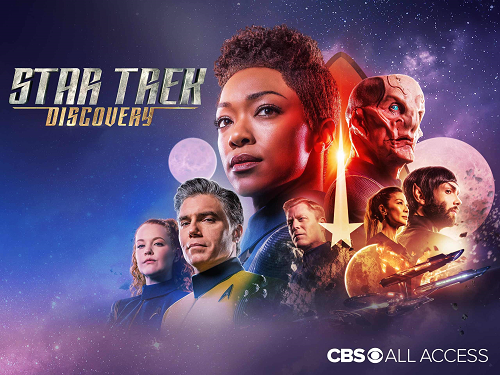
As you probably know, I’m a huge Trekkie. Star Trek: The Next Generation (TNG) is one of my favorite series of all time. The TNG series finale is DEFINITELY my favorite series finale of all time—I dare you not to cry when the main cast all sit down to play poker for the last time! I’ve been lukewarm about the Star Trek series that came after—Voyager, Deep Space Nine, Enterprise—but I’m still in love with the Star Trek universe overall and its science-heavy storylines and themes of hope. So I was super excited when they announced a new Star Trek series, Star Trek: Discovery. I even subscribed to CBS All Access so I could watch it!
And I was super into it! …For a while. But something about it felt…off. I started to lose interest halfway through the second season. It wasn’t that I didn’t care about the plot or characters, though the characters did start grating on me (especially Tilly…every time she starts babbling a deus ex machina solution to the episode’s tech problem, I wanna reach through the screen and slap her…sorry Tilly fans). It was that it didn’t feel like Star Trek.
After thinking about it for a while, I finally realized the problem. It’s the same issue that plagued the final seasons of Game of Thrones: the writers are trying to turn a sociological story into a psychological one, and the results are less than ideal.
My rationale won’t make sense without some basic knowledge of the show’s plot, so here it is in a nutshell (no spoilers in this section…okay one minor spoiler if you’re hardcore about that sort of thing): The series is centered on Michael Burnham, the human female adopted sister of Spock. Weird how she was never mentioned in any other Star Trek story featuring Spock or Spock’s family…the show tries to explain it away as a “rift” between her and Spock, but it’s all very convoluted and ultimately you just have to roll your eyes and accept the obvious retconning if you want to enjoy the show. Anyway, Burnham is hot shit in Starfleet until she disobeys her commander—an awesome Michelle Yeoh (one character I absolutely love, especially—minor spoiler—her evil double)—in a misguided attempt to stop a war with the Klingons. It’s a decision that ultimately ends up killing her commander and starting the war. Doh! (A war between the Klingons and Starfleet is part of Star Trek cannon…now we know how it all started! Dammit, Burnham!)
So Burnham becomes the first person in Starfleet ever to be convicted of treason. Way to blaze that trail, girl! Fast forward about a year, when she’s granted parole to serve on the starship Discovery in their super-secret mission to create the ultimate weapon to win the war against the Klingons. And so the first season goes.
There are some interesting twists and turns, with an awesome secret reveal toward the end of the season that paints everything that came before in a new light. The ending was a bit too saccharine for me, but Star Trek has always been a hopeful show, which was one of the things I liked about it, so some sugar shock is to be expected as the new series works to find the right balance between conflict (the engine of all stories) and hope.
The second season follows a similar trajectory, but here’s where the show’s critical flaw becomes obvious.
*Spoilers follow! Skip ahead to the second sign to remain unspoiled.*

So the big twist in season 1 is that the leader of the Discovery, Captain Lorca, is actually from an alternate universe where the Federation (known as the Terran Empire in the “dark” universe, as established in the episode “Mirror, Mirror” from Star Trek: The Original Series, aka TOS) is eeeevil!! He’s been pretending to be the “light” universe Lorca–who died in the event that brought dark Lorca into the light universe– in order to use the Discovery’s tech to get back to his own universe (the Discovery’s big war-winning tech is that it can teleport to basically any other place in the universe in an instant…turns out it can also teleport to other universes).
In the dark universe, Yeoh’s commander is alive and also the Emperor of the Terran Empire, and Burnham is her adopted daughter…Wait, what?
……………Okay. Seems like a pretty far-fetched coincidence, like Burnham just happening to be Spock’s adopted sister and also just happening to be the one who started the war with the Klingons.
Burnham also pretty much single-handedly ends the war with the Klingons by giving a “Can’t we all just get along??” speech in the final episode of season 1. Then she’s pardoned and given a permanent post on the Discovery. That was easy!
The plot of season 2 revolves around a mysterious force from the future leading a trail for the Discovery to follow to what turn out to be major galactic events, and also warns them of an upcoming apocalypse. This mysterious force turns out to be…Burnham’s long-presumed-dead mother! She used time travel technology to avoid being killed by Klingons—thereby retconning the first season’s explanation for why Burnham was an orphan (sigh)—but then got stuck in the future. ONLY BURNHAM can bridge the gap between her mother and the Discovery to save all life in the galaxy—
*End of spoilers*

This is the point where I rolled my eyes, said, “Bitch, please,” and lost interest in the show.
Here’s the thing: Star Trek has always been a sociological series, as in it’s a series that looks outward to tell stories within the context of a shared system all the characters reside within. In this case, the system is space exploration (as a metaphor for cultural exploration). That’s why there have been so many spin-offs; the Star Trek universe exists separately from any individual character, including the original gang of Kirk and crew.
In previous Star Trek series, the idea was that the universe was alive with activity happening irrespective of what people on the Enterprise were doing. A typical episode would center on the crew we know and love venturing into one of these already-in-progress situations and reacting to it.
However, by making Burnham the main character at the center of a season-long arc (rather than a one-episode arc, which is the typical Star Trek format), the show took a sociological story and turned it into a psychological one. Psychological stories are based around a person and their inner growth and goals; these stories look inward. They’re much easier to write than sociological ones because they have a clear beginning, middle, and end; they fit into the preferred Hollywood storytelling format. This is probably why Discovery (and I hear Picard, though I haven’t caught that one yet) have eschewed the sociological roots of the Star Trek universe for the psychological—Hollywood writers these days don’t know how to tell stories any other way.
The problem with turning a sociological story into a psychological one is that the central character, instead of being a focal point to introduce us to a complicated system ala Ned Stark in GOT, then becomes the center of the entire story. Their inner journeys are mirrored by their external journeys, and everything in the story has to connect back to their growth or goals somehow. Everybody in the story is a reflection of that person’s strengths or weaknesses (the “character web”).
Since Star Trek is a universe-spanning series about space exploration, what effectively happens by making Discovery a psychological story is that not only is Burnham the center of the show, she’s literally the center of the universe.
This is why we keep seeing Burnham improbably traipsing through major Star Trek events Forrest Gump-style, and interacting with major characters in obviously retconned ways. Star Trek has always been a series based around the ethos that when people work together, whether they be different races or different species, they can achieve great things and overcome any obstacle. But when you have one character who’s the center of it all, that person ends up being instrumental to solving every problem, which ends up contradicting the “teamwork” theme.
Discovery’s detractors have accused Burnham of being a Mary Sue, and I think they’re right. Sometimes sexist assholes use the term to gripe about how a GIRL couldn’t possibly do the same things their male counterparts can do, the most recent example being Rey vs Luke in the latest Star Wars trilogy…Rey is NOT a Mary Sue, BTW (I won’t get into it here, this post is already hella long…and I just wrote about Star Wars and don’t want to write about it again dammit). But in this case, I’m using the original meaning of the term to describe someone who’s inexplicably desired by everyone and unrealistically good at everything they do, even in the context of the story they’re in (Gary Stu—the male version of the Mary Sue—exist too, they’re just not called out nearly as often as the female versions).
[Interesting fact: the term “Mary Sue” originated from TOS fan-fic!]
Burnham is a Mary Sue, but not because the head writer fan-girled herself into the narrative. Burnham was obviously written to be your typical hyper-competent Starfleet officer with some relatable flaws–which, it should be noted, describes almost every Star Fleet officer ever dreamed up. But by making her the star of the show, she comes off as a Mary Sue. Her Mary Sue status is the result of the show around her, not the cause of the show’s issues.
So that’s what the hell is off with Star Trek: Discovery. I’ll probably finish the series at some point. The third season just came out, I might as well see how it all connects back to Burnham somehow—maybe she’ll go back in time and it’ll turn out she’s the original human, or she’ll give birth to Captain Kirk, or she’ll become Q. We’re all still in (mostly) quarantine, and the holiday break is coming up and probably nobody’s gonna travel. I know I’ll be sitting at home getting quietly smashed off moonshine eggnog while my kids scream at me that they’re bored and I ignore them. Can’t wait.
